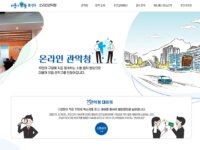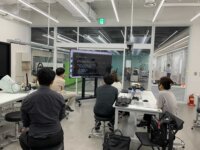Mapo-gu created a “SOS One-Stop System” for safe bicycle path. Since there are few buildings or facilities on the bicycle path, it is difficult for users to determine their current location. The basic number plate which is installed on the bicycle path shows the path name and location number and also includes a QR image associated with the system. Through the system, people can quickly call for help in the event of an accident.
Country: Korea
Case Study
Personalized feedback service for national qualification test result – Digital Mentor Service…

"Why did I fail? How should I develop my career?" To address such concerns, we developed the Digital Mentor Service of National Qualification. It leverages massive data on national qualification tests to identify each individual's weaknesses and why they fail. It also provides personalized information by matching examination history with jobs and training offered by government agencies. Supporting test takers from skills assessment and development to job placement.
In 2017, Korea opened the online platform allowing the public to make policy suggestions, ‘Gwanghwamun 1st street’ as an effort to expand Direct Democracy. Following this lead, Gwanak-gu developed its own online platform, ‘Online Gwanak-gu Office’. ‘Online Gwanak-gu Office’, which is exclusively for Gwanak-gu citizens, utilized user participation during development, and its innovation comes from the integration of various existing public participation routes.
Small and medium-sized companies often cannot afford investments in Artificial Intelligence technologies. Through AI Friends project, AI became more accessible, affordable, and familiar for entrepreneurs and citizens. AI festival, training, co-working spaces, and pilot solution consulting is operated through the cooperation of universities, research institutes, industries, government, and citizens over the last four years.
Case Study
Neighborhood Joint Delivery – Establishing a Regional Environmentally-friendly Integrated…
Neighborhood Joint Delivery was introduced in 2022 to solve delivery issues. Delivery volume in Seoul since 2015 has increased by about 2.8 times, causing traffic, environmental, safety and labor problems. Seoul will create regional bases that integrate services from several couriers to deliver parcels collectively, reducing distance traveled by 50% and improving efficiency by 40%. The eco-friendly bases will collect recyclables, and serve as a base for unmanned autonomous vehicles.
The Smart Station project for future urban subway station has accelerated the digital transformation for public transportation industry, which has been slow to change, by applying fourth industrial technologies such as IoT, 3D digital twin technology, AI image analysis, and deep learning technology. Through this, the station has secured a control tower that can manage all lines for safe subway station operation, station workers can innovate their work through augmented reality UI systems.
The Busan Port Authority (BPA) has completed the two innovative projects utilizing the features of sea port, one is ‘piezoelectric power generation system’ and the other is ‘construction wastes recycling project’. Both the piezoelectric power and the recycled construction wastes have been assessed not only to contribute to the improvement of environment, but also, to reduce construction cost. The BPA plans to share the gained outcomes of those projects with other domestic and foreign…
In cooperation with the Korean government, major companies, social enterprises, and international organizations, Ulsan Port Authority (UPA) has initiated a project of “upcycling plastic waste coming from ships,” aiming to solve harbor-specific ocean plastic pollution. The UPA has improved upon the policies on discharging plastic waste from ships and created an upcycled product using the plastic waste. The UPA’s practice has contributed to reduce ocean plastic pollution.
In order to respond to the surge in unprecedented pandemic of COVID-19, Korean government swiftly developed the Epidemiological Investigation System based on Smart City Data Hub technology. It is designed to help officials quickly trace transmission routes and places through real-time data analysis such as mobile information. This system reduced the time for investigation from 24 hours to less than 10 minutes, enabling the containment of the pandemic in early stage and effective quarantine.
Viet Nam has suffered a drastic decrease in mangrove forests in recent decades driven by the growth of aquaculture. The governments of the Republic of Korea and Viet Nam have decided to resolve this issue through cross-sector collaboration between the forestry and fisheries sectors of both governments. Through this cooperation, the two governments will help local people restore and sustainably manage mangrove forests while also improving their livelihoods through eco-friendly aquaculture.






